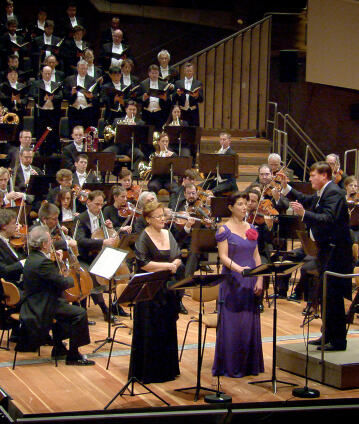Christian Thielemann conducts Beethoven’s “Missa solemnis”

Ludwig van Beethoven regarded the Missa solemnis as “the best of his sacred works”. In this complex work, magnificent praise to God is as important as the gentle humanist message. On top of this there is the driving energy that we know from Beethoven’s symphonies. The concert is conducted by Christian Thielemann, who has given impressive performances of many great choral works with the Berliner Philharmoniker.
Following Bach’s B Minor Mass, the Berliner Philharmoniker now perform another mass setting which is a milestones in the history of music: the Missa solemnis by Ludwig van Beethoven. The work was composed for the upcoming installation of Archduke Rudolph of Austria as Archbishop of Olomouc. Beethoven wanted to give his pupil, friend and mentor a musical gift “to the glorification of that solemn day”. But the ceremony took place without the new mass. The composer had not finished – because he was wrestling with a work that would go beyond the scope of the genre. In his Missa, which was performed in full for the first time four years after Rudolph’s inauguration, Beethoven combined Catholic liturgy and dramatic expressiveness, contemplative prayer and hymn-like gestures, archaic elements and symphonic design into a monumental work of art that the composer himself described as “the most successful product of his mind”. The synthesis of text and music is masterly: in the Credo, for example, it gives the “Et incarnatus est” a mystical intensity through the use of church modes, and at the petition “Dona nobis pacem” in the Agnus Dei, he points out with parading military fanfares how threatened the peace is. He links old compositional techniques from the time of Palestrina and the Baroque such as imitative and fugal part writing with the modern principles of the symphony.
Beethoven himself saw in the work more than a mass: it could – as he wrote in letters to Goethe and Friedrich Zelter – “also be given as an oratorio”. But whether Mass, oratorio or choral symphony, the composer’s intention was “to awaken and permanently instil religious feelings in the singers as well as the listeners”. Since the turn of the millennium, the Berliner Philharmoniker have performed the Missa solemnis three times: in 2002, conducted by Nikolaus Harnoncourt; in 2007 with Bernard Haitink, and in 2012 under Herbert Blomstedt.
Conducting the orchestra on this occasion is Christian Thielemann who has appeared with the Philharmoniker more often in recent years with performances of choral works, including Giuseppe Verdi’s Quattro pezzi sacri, the German Requiem by Johannes Brahms, Gabriel Fauré’s Requiem and Anton Bruckner’s Mass in F minor. At the side of Christian Thielemann and the Berliner Philharmoniker in these works was one of the greatest choirs of our time: the Rundfunkchor Berlin, which also participates in the performance of the Missa solemnis. The cast of performers is completed by a distinguished quartet of soloists: Luba Orgonášová, Elisabeth Kulmann, Daniel Behle and Franz-Joseph Selig.
© 2017 Berlin Phil Media GmbH
Related interviews
Artists
Our recommendations
- Marin Alsop conducts depictions of nature
- Simon Rattle conducts Beethoven’s Symphony No. 9
- Simon Rattle conducts Beethoven and Mendelssohn at the Waldbühne
- Sir Simon Rattle conducts Mahler’s Symphony No. 2
- Donald Runnicles conducts a concert “à la française”
- Marek Janowski conducts Bruckner’s Sixth Symphony